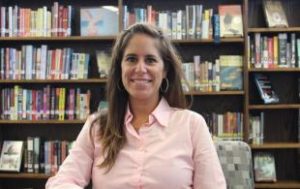We wanted to share one of the impacts of this year’s One Maryland One Book program!
Jennifer Meltzer is the Library Specialist at Pikesville High School. She has taught U.S. History, World History, History through Films, Criminal Justice and Facing History, AVID and EPI. Jennifer is a contributor to the 40 Weeks of Learning blog on WordPress featuring stories from Baltimore County Public Schools. This essay was originally published on the 40 Weeks of Learning blog on October 5, 2017.

This past spring our school seized an opportunity to embark on a new journey pertaining to summer reading at Pikesville High School. With the collaborative efforts of our English Department Chair, Erin Haroth and our Principal, Mrs. Sandra Reid we decided to implement a school-wide read. We had approached this idea in the past, but this time, we took deliberate steps to have a deep and meaningful impact for our students. We decided to select the One Maryland, One Book title, which is a book identified by Maryland Humanities for exceptional literary quality. Additionally, the title must be one that connects with high school students as well as adults and be one that can sustain long term discussions. This year’s theme of “home and belonging” led their selection committee to the novel, Purple Hibiscus by Chimamanda Adichie.
In order to have a large number of copies of this book readily available for our students we applied to participate in the One Maryland, One Book program which provides 30 free copies of the book along with educational resources. This provided us with a jumpstart, so to speak, to get us moving in the right direction. Our principal provided additional school funds to purchase 50 more copies of the book. Almost all of our local copies of this novel went into circulation. Over 50 percent of our staff read the novel, spanning content areas and positions. From secretaries to science teachers, our staff was involved! We are unable to count the number of students who read the novel by acquiring it by their own means, but we know from completed summer reading assignments, that they are numerous.
In order to draw our students into this school wide read, we coupled the mass quantity of books on hand with a marketing campaign. I personally delivered numerous televised morning announcements showcasing the book. We sought out the expertise of our incredibly gifted interactive media production students to help us design posters and assignment papers that would advertise the novel and the program we were offering. The program consisted of five suggested assignments to be completed such a student created playlist to go along with the novel or a character interview. We also offered a summer reading celebration for all students who participated. This event took place last Thursday, the 28th of September. I reached out to Dominos Pizza of Pikesville and Wegmans of Owing Mills and both businesses donated enough food for our entire luncheon. During the celebration, students shared their projects, engaged in “dice discussions” and listened to staff member’s reactions to the book. I shared my personal family story (which paralleled the book in so many remarkable ways) using the Pecha Kucha story-telling strategy coupled with Voice Thread, one of the digital tools offered in BCPSOne.
What our school experienced as a result of this school-wide read was a one-ness that was palpable. Our STAT teacher, Mrs. Theresa Bates, commented on how wonderful it was to visit classrooms and hear students refer to the book in multiple class discussions and activities. The novel became a reference for many in providing examples of various themes, such abuse, political power and religious fanaticism.
For me personally, this experience was life changing, both personally and professionally. I have reconnected with the foundational pedagogical practice of making connections with students and finding ways to connect students’ learning to their personal lives continues to stay at the forefront of my practice. When I asked one of my students what she saw as the benefits of a school wide read she responded, “It allows students to perceive different views of other cultures and traditions and see that people are more than what people see them as. It unifies different groups of people together and doing a school wide read encourages people to express and understand, or interpret a piece of literature to broaden their mindset.” What I witnessed at our summer reading celebration, where students of all different groups and grade levels came together, was evidence that students did just that.
Disclaimer: The views and opinions expressed on our blog do not necessarily reflect the views or position of Maryland Humanities or our funders.

